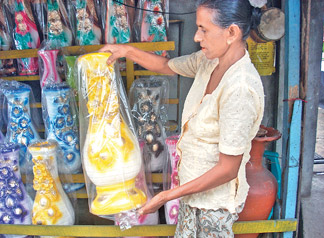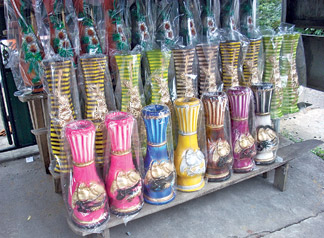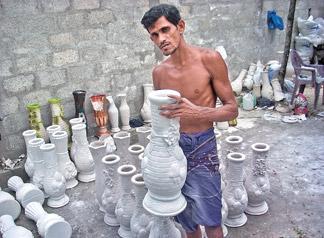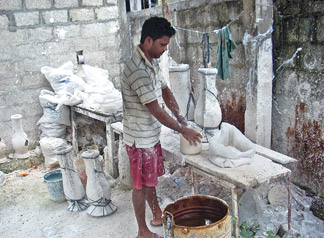Imported products hit flower vase manufacturers
By Ananda KANNANGARA
|

Karunawathi selling a vase
|
Sri Lankan pottery industry has a long history of over 2,000 years.
Our history reveals that the livelihood of villagers during the era of
king Devanampiyatissa was pottery making and agriculture. After
embracing Buddhism, the King was in the habit of visiting temples and
also meeting Buddhist monks and villagers. He saw villagers making clay
pots and various other items from clay. The King had a great enthusiasm
over the clay industry and encouraged villagers to develop their
traditional pottery industry.
The present generation who belongs to ancient pottery makers has now
changed their business strategies and started manufacturing other items
from clay according to the needs of people. As a result, majority
manufacturers have now focused attention towards making ornamental items
such as statues of animals.
The arrival of Plaster of Paris to the local market from foreign
countries over 40 years ago completely changed the industry. Thereafter,
craftsmen started making attractive ornamental items such as Buddha
statues, wall pictures, flower vases, images of gods and statues of
animals.
Plaster of Paris is a white paste of gypsum. The mixture is made by
adding water. Thereafter the prepared mixture is poured to a galvanised
mould. The moulds could also be manufactured with fibre. After a few
minutes, the prepared flower vase is taken out from the moulder and kept
under the sun to dry for another two hours. The vase is then sprayed to
add colours.
According to craftsmen, the price of a high quality bag of plaster of
Paris is Rs. 600.00 in the open market and the low quality bag costs
around Rs. 450. Plaster of Paris is highly used by craftsmen to make
statues and various shapes of colourful flower vases. These vases are in
a superior quality and cannot be compared with the same type of low
quality vases, currently being imported from China.

|
 |
| Ratnasiri with
his products |
 |
| Turning out
vases |
Local manufacturers say that there is a large difference between the
quality of locally made flower vases and imported Chinese vases. The
prices of locally made flower vases range from Rs. 200 to Rs. 250 each,
while some people are still in the habit of buying low quality imported
goods by paying Rs. 1,200 for each.
If anybody visits Maha Yala, Alawathena or Senasungoda villages in
the Kalutara District, he could see thousands of families that are
engaged in the flower vase manufacturing industry.
This has now become a self employment project to many household even
in the villages of Pinwatta, Ampitigala, Keselhenawa and Remuna.
According to statistics, nearly 1,500 families living in these villages
are engaged in the industry.
The Sunday Observer last week visited several areas in the Kalutara
District and at Kiriella to meet flower vase manufacturers.
A longstandingflower vase manufacturer, T. Ratnasiri of Maha Yala
said he has been in the industry for the past ten years and no proper
recognition has yet been granted by the Government to manufacturers.
He said a separate authority should be established to recognise the
industry to protect manufacturers and also their business activities.
He urged officials in Divisional Secretariats to register all flower
vase manufacturers living in villages and listen to their grievances.
He also reminded the Government has established authorities to
protect all other industries such as s gem, coal, mineral sands and
graphite and asked why a separate authority is not established to
protect flower vase manufacturers.
A flower vase manufacturer, L.P. Haramanis of Ampitigala said,
although Sri Lanka's pottery industry has a long history of nearly 2,000
years, it is a pity that the authorities have not given due recognition
to it yet.
"I hope the Government will focus attention towards people who are
engaged in the flower vase making industry and help them develop the
industry,"
He said in addition, people who are engaged in the flower vase
manufacturing industry should be provided with medical benefits and
insurance facilities.
A longstandingflower vase manufacturer and the owner of Gamini Flower
Vase maker, Pinsiri Alawatta said his father Kumarasiri Peiris started
the industry in 1985 and he took over the business thereafter.
"In addition, I have two boutiques at Remuna to sell products. I have
also provided employment to ten persons in the village and if Government
supports to export our products we could survive, if not, we might have
to close down our industries."
He also appeals authorities to stop importing flower vases to protect
local industrialists.
He said he will hand over the business to his son Kamalsiri who is
presently employed as a driver in a company.
He also proposed officials to register flower vase manufacturers to
enable them to get bank loans and various other benefits.
He said that the industry should be given the due place by the
Government for the benefit of over 1,500 families who currently depend
on the industry.
A father of three, Saman Kulaweera of Alawathena said he has been in
the flower vase making industry for the last 15 years and proposed the
Government to establish a special market place in Colombo to develop the
industry.
He also asked Government Departments to purchase flower vases from
their village manufacturers rather than buying them from middlemen at
exorbitant prices.
Nimal Gunatilake of Yala said he has been in the industry for the
past eight years and getting a little income since people have got used
to buy low quality imported vases.
"I appeal the Industrial Ministry to stop importing inferior quality
Plaster of Paris to Sri Lanka to protect the industry". He said at
present many Government institutions buy low quality products from
middlemen at cheap rates.
He also proposed the Government to grant bank loans to flower vase
manufacturers.
Kamalawathi Perera of Remuna said unlike earlier, at present she
sells about 10 to 15 vases a day, because many people are buying low
quality vases at cheap rates.
He said he has never seen Government officials visit their villages
to see the development of the flower vase making industry. If they come
they can see the pathetic situation of the industry as many vase
manufacturers are not in a sound financial background due to the arrival
of Chinese flower vases to the country.
He said in the olden days, businessmen used to come from Colombo in
vehicles to buy their products, but they rarely come now, because of the
imported products.
He proposed the Ministry of Small Industries to arrange a proper
transport system to transport the products from the village to Colombo
and other major cities, so that it will immensely benefit village
manufacturers to get a good income.
He said as there was no proper transport system, very often
businessmen coming from Colombo to buy their products at cheap rates.
"They purchase a flower vase for Rs. 180 and sell the same product
for Rs.450 or more and earn an additional profit of Rs. 220 from each
vase." He also proposed the Sri Lanka Tourism to instruct hoteliers to
open shops in their hotels to sell flower vases.
A 60-year-old flower vase manufacturer, H. Karunawathi of Maha Yala
appealed to the officials of the Bandaranaike Airport, Katunayake to set
up a separate place for the benefit of handicraft manufacturers, so that
they could sell flower vases to foreigners.
|

